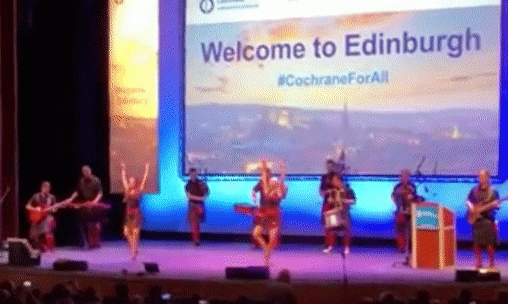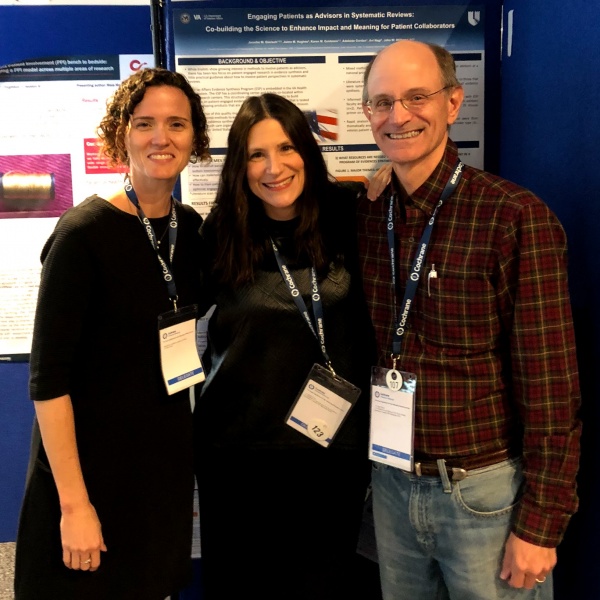
Cochrane UK hosted the 25th Cochrane Colloquium at the Edinburgh International Conference Centre in Scotland, September 16-18. Among the attendees were 3 familiar faces of Duke: John Williams, MD (GIM), Karen Goldstein, MD (GIM), and Jennifer Gierisch, PhD (Population Health Sciences). Read more about the event in the post below, submitted by John WIlliams, MD, GIM Professor of Medicine, and Karen Goldstein, MD, GIM Assistant Professor of Medicine.
Cochrane is the premier international organization for systematic reviews. Their evidence syntheses are used by policymakers, guideline developers, and clinicians. The meetings are not only critical to professional development for those conducting systematic reviews, they are fun! We presented a poster (led by Jennifer Gierisch) on engaging patients/Veterans in systematic reviews and our VA Evidence Synthesis Program (ESP). This was my 8th Colloquium, and I find it a great opportunity to learn new methods, new process/software platforms and learn from others.
One of the things I enjoy about Cochrane is the international collaboration. I got to meet with colleagues from all over the world (including - Canada, Italy, Norway, Spain, Australia, New Zealand). Getting perspectives on research and healthcare from smart people working in other parts of the word is a priceless opportunity. I also like that Cochrane makes time for fun and they have a lot of good dancers in the group! Each meeting features an introduction to the culture of the host country so we started the meeting with the “Red Hot Chili Pipers” - a bagpipe, drum and dance group. Our end of meeting gala, was at the National Museum of Scotland, a beautiful venue, surrounded by history (including Dolly - the first cloned mammal). Entertainment by Scottish musicians and dancers followed by delegates (aka - meeting attendees) doing the Virginia Reel and then hitting the disco floor.
 Karen Goldstein adds:
Karen Goldstein adds:
This was my first time attending an international Cochrane meeting and I found it to be an engaging and exciting event. I was able to see the breadth of evidence synthesis work going on around the world and meet scientists from all sorts of organizational, academic and governmental settings who are committed to making sure that patient care is informed by current evidence. I attended a mix of educational “how to” sessions and workshops sharing the cutting edge of evidence synthesis (e.g. artificial intelligence for citation screening and how to overcome hurdles with rapid reviews). In addition, many of these sessions provided opportunities to provide input and ideas to leaders from Cochrane who are shaping guidance around this methodology. It is telling that when I got to the end of the three and a half day conference, rather than being exhausted or burned out - I was energized and inspired to get going on my next evidence synthesis project!